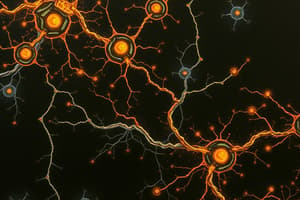Podcast
Questions and Answers
What is chemotaxis?
What is chemotaxis?
- The migration of immune cells towards the lowest concentration of chemokines at the site of inflammation
- The migration of immune cells away from the site of inflammation
- The migration of immune cells towards the highest concentration of chemokines at the site of inflammation (correct)
- The migration of immune cells in a random direction at the site of inflammation
What is dysbiosis?
What is dysbiosis?
- The absence of harmful bacteria in the gut
- When harmful bacteria outnumber beneficial bacteria in the gut (correct)
- When beneficial bacteria outnumber harmful bacteria in the gut
- The presence of beneficial bacteria in the gut
What is the purpose of antibody-based detection methods?
What is the purpose of antibody-based detection methods?
- To activate immune cells and cause them to adhere to the endothelial cells
- To cause an inflammatory response in the body
- To diagnose diseases and monitor treatment efficacy (correct)
- To weaken the tight junctions between gut cells
Flashcards are hidden until you start studying
Study Notes
Signal Transduction, Dysbiosis, Antibody-Based Detection Methods, Mechanism of Chemokine Action, and Molecular Switches
- Dysbiosis occurs when harmful bacteria outnumber beneficial bacteria, causing the mucus membrane to become impaired and tight junctions between gut cells to weaken.
- Gaps between gut cells allow bacteria to penetrate through the impaired mucous membrane and enter the bloodstream, triggering an inflammatory response.
- Antigen-antibody binding occurs when an antigen enters the body and triggers the production of antibodies that bind to a particular antigen through weak interactions.
- Confocal microscopy, conjugated secondary antibody methods, flow cytometry, immunoprecipitation, and Western blotting are antibody-based detection methods used to visualize specific target molecules in biological samples.
- During an inflammatory response, chemokines produced by endothelial cells attract immune cells to the site of inflammation by binding to specific receptors on the surface of circulating immune cells.
- This binding triggers a series of intracellular signaling events that activate immune cells and cause them to adhere to the endothelial cells, migrate through the vessel wall, and reach the site of injury or infection.
- Chemotaxis is the migration of immune cells towards the highest concentration of chemokines at the site of inflammation, enabling a coordinated immune response to eliminate the invading pathogen or repair the damaged tissue.
- Molecular switches are biological molecules that can exist in multiple conformations or states and can toggle between them in response to specific signals or stimuli.
- GDP and GTP are an example of a molecular switch, where GDP is the "off" position and GTP is the "on" position.
- Diseases associated with inflammation include auto-immune, inflammatory, infectious diseases, cancer, liver diseases, obesity, metabolic disorders, brain, cardiovascular, and GIT diseases.
- Dysbiosis is implicated in the development of several diseases, including inflammatory bowel disease, type 2 diabetes, and obesity.
- Antibody-based detection methods, such as Western blotting, are commonly used in research and clinical settings to diagnose diseases and monitor treatment efficacy.
Studying That Suits You
Use AI to generate personalized quizzes and flashcards to suit your learning preferences.




